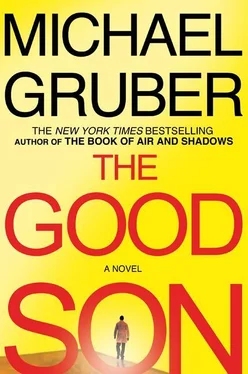Uproar: they did not like this, not so much for the analysis as for the use of “dung” and “Qur’an” in the same sentence, but he was not dismayed.
“Listen!” he cried in a parade-ground voice. “Listen, believers, and let no one say you were afraid of hearing the words of a dead man. These are my last words, and I do not lie.”
They settled, and he resumed.
“Everyone knows this, but everyone disagrees about what should be done. Some say, abandon the traditional ways and become just like the rich countries, but no Muslim country has been able to do this except Turkey, which is a special case and only partly successful. Others say socialism-or said, because that has proven a false hope. Still others say, and you among them, let us return to living under the sharia, the law of God. If you meant that, no one would oppose you. Who in the West would give two pins if you all decided to live simply and be devoted to God? In America there are people, Christians called Amish, who live as their forefathers did, without electricity or machines, simple lives of peace, and everyone praises them and even envies them, a little. Or there are Jews who follow the exact law of Moses and dress as they did three hundred years ago, and who bothers them? But you don’t want to live under sharia, if living so means living peacefully in a museum. No, not at all. You want to rule. You want all the goods of the West, you want Viagra and tanks and missiles and electricity and cell phones and computers. But you can’t pay for these things because you also want to remain ignorant and uneducated, so you become tools of the oil sheikhs and sell drugs. You become the dogs of anyone who will buy you a gun. Is this the word of God? And who are these strangers you follow, from Arabia, from Egypt, who tell you it is forbidden to do things that your fathers and their fathers’ fathers did for as long as there have been Pashtuns? Were your fathers infidels? O Pashtuns, who taught you to spit on the graves of your ancestors?”
Now a more violent pandemonium than before. Every mujahid in the room is up and shouting. One man draws a huge knife and runs at Ashton, jabbing and screaming insults. Ashton holds his ground and two men rush out from the throng and lead the enraged man away. Sonia looks at Alakazai. He is shouting for silence, but his voice does not carry; it is an office voice and grows shrill, like a girl’s, when he puts power behind it. But now Idris Ghulan calls for silence with a voice of brass, and pulls out a pistol and fires two rounds into the ceiling.
Instant shocked silence, every ear rings from the shots, and all watch the sparkling dust float down from the bullet spalls and dance in the light bars streaming from the high windows.
“Let the man speak,” says Idris, and Sonia sees that the emir looks like he has been struck. All the men sit, if they have a place, and Ashton speaks again, as if he had never been interrupted.
“Now as to this teaching. Where does it come from? None of you would drink from a stream unless you knew the water was pure and unpolluted, or eat meat that was not prepared according to the law of halal, but you don’t take the same care of what you put into your minds, although the mind is the seat of the soul and it is the soul that will live in paradise, as you believe. Would you bring a polluted soul before God? So you must have a care with what you believe.”
Sonia sees looks of puzzlement cross the faces of the assembly. The idea of questioning their received beliefs has never occurred to them. It is like thinking about whether air really sustains life. But Ashton launches forth, unconcerned, into a history of modern jihadism, starting with its godfather, Mohammed ibn Abd al-Wahab, in eighteenth-century Arabia, and his Salafist belief that the first three generations after the Prophet practiced the only pure form of Islam and that all Muslims must return to this purity. Then he moves forward by leaps through the period of colonialism and the discontents it caused, with a side trip through the Indian Mutiny, then on to the effects of the dissolution of the caliphate in 1924, the feelings of abandonment that spread through the umma as a result, the writings and influence of Abdul Ala el-Mawdudi here in what became Pakistan, his passionate appeal for a rejection of the Enlightenment and the modernity that followed it, establishing the premise for a new kind of jihad. Not only were Muslims to resist the colonial oppressors, for it was abominable for infidels to rule over them, but, even more important, they were to resist the interior colonialist, their admiration for the power of the infidels, their sneaking urge to imitate them and grow rich and powerful themselves. This was a form of idolatry, he wrote, as bad as the jahiliya that the Prophet had overthrown.
Now Sonia sees nodding heads-the infidel is starting to make sense. Ashton has loosened his stance; he is gesturing dramatically now, but only with his left hand. He keeps his right arm clenched to his side, as if it has been wounded.
He speaks further in the same vein, about the great Sayyid Qutb, the Egyptian who first extended these ideas to a condemnation not only of colonial regimes but also to supposed Muslim states that aped the infidels and pursued modernism, socialism, democracy, and liberalism. The poverty and weakness of the Muslim lands was their fault, Qutb said, because they had turned from the true religion. They were apostates, illegitimate, and every real Muslim was bound to resist them. The goal was nothing less than the restoration of the caliphate, a system in which state, religion, and society were again one, unfragmented, guided by the eternal word of God, embodied in the sharia. Qutb died a martyr, but his ideas could not be killed so easily. They spread, urged on by the shame of the Zionist usurpation of Palestine and the holy city, Al Quds, and the assaults on the umma by the Russians and the Americans. They were turned into action by al-Qaeda and the Taliban, and here Ashton tells the familiar story of triumph and defeat and renewal. He says, “These ideas now live on in you. This is why you are here.”
Ashton pauses and looks out at the ring of dark, bearded faces. They are silent now, waiting, interested. He hitches up his right shoulder in a peculiar way and continues.
“The question now is whether you will succeed. Will you bring the caliphate to life again and erase five centuries of history? And the answer is that of course you will not. As the poet says, The moving finger, having writ, moves on; the Muslims may yet have another golden age, but it will not be like the last one, not at all. And your terrorism is futile. Terror is always futile, an announcement of impotence, the rage of a spoiled child. The powers of the earth will never allow a regime forged by terror to survive. The Palestinians have been crushed, the Chechens have been crushed, and the Russians left Afghanistan for the reason that all foreign powers leave Afghanistan, not because of the valor of the Pashtuns but because Afghanistan is worthless, a dry, rocky country that produces nothing but apricots and opium.”
At these words the audience begins to rumble menacingly, but Ashton raises his voice and goes on.
“At some level you know this, and that knowledge is symbolized by the suicide bomber. In all history, no campaign of suicide has ever prevailed. It is the last stage of impotent fury-meaningless, insane. At last we come to that word, and the purpose of the conference you have held hostage, which was to examine the psychological basis of the jihad. I am not a psychologist, but I have a theory. Perhaps my colleagues will disagree and call me foolish, but I will not be around to hear it, and I speak, therefore, without fear of contradiction. The key lies, I believe, in the one feature that marks all Salafist regimes, from Saudi Arabia to the Taliban, and that is the oppression of women.
Читать дальше












